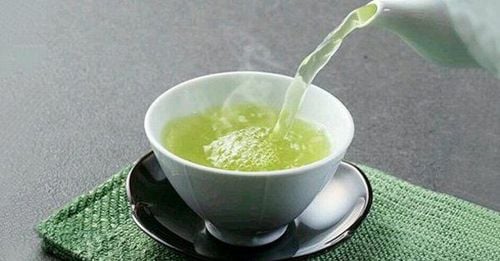This is an automatically translated article.
Green tea is used to make various drinks, green tea water can make the drinker awake, reduce high cholesterol or other fats (lipids) in the blood (hyperlipidemia) and take care of skin. Is drinking green tea daily good for health?
1. The mechanism of action of green tea
The useful parts of green tea are the leaf buds, leaves and stems. Green tea is produced by steaming fresh leaves at high temperature. In the process, it is able to maintain important molecules called polyphenols, which are responsible for many of the benefits of green tea. Polyphenols can prevent inflammation and swelling, protect cartilage between bones, and reduce joint degeneration.
Green tea also seems to be able to fight human papillomavirus (HPV) infections and reduce the growth of abnormal cells in the cervix (cervical dysplasia). Green tea contains 2% to 4% caffeine, which affects thinking and alertness, increases urine output, and may improve the function of important brain messengers in Parkinson's disease. Caffeine is thought to stimulate the nervous system, heart, and muscles by increasing the release of certain chemicals in the brain called "neurotransmitters." The antioxidants in green tea may help protect the heart and blood vessels. In addition to the above effects, antioxidants in green tea are considered in the treatment of Alzheimer's, cancer, and skin care.
2. Green Tea Antioxidants and Alzheimer's Disease
September 20, 2005, antioxidants in green tea may protect the brain and counteract the memory damaging factors seen in Alzheimer's disease.
One study found that high doses of a green tea ingredient called epigallocatechin-3-gallate (EGCG) significantly reduced beta-amyloid protein formation in the brains of mice altered to develop Alzheimer's disease. Abnormal accumulation of beta-amyloid plaque in the brain is associated with nerve damage and memory loss in Alzheimer's disease.
EGCG is one of a group of antioxidants called flavonoids found in plants. They have many health benefits such as protecting against cancer or reducing the risk of heart disease.

Sử dụng trà xanh hàng ngày rất tốt với người bệnh Alzheimer
3. Antioxidants in green tea may protect the brain
In a study published in the journal Neurology, researchers looked at the effects of treating mice genetically engineered to develop Alzheimer's disease with high doses of green tea antioxidants. After several months of daily injection of EGCG, the results showed that the neurons of the treated mice produced 54% less beta-amyloid protein than the untreated mouse neurons. Researcher Jun Tan, PhD in Neurology at the University of South Florida, said: "The findings suggest that the concentrated composition of green tea can reduce beta-amyloid plaque formation in the brain." . If beta-amyloid pathology in this mouse model of Alzheimer's is representative of human Alzheimer's disease, then dietary supplementation of EGCG may be effective in preventing and treating the disease." Green tea contains various antioxidants.Researchers have also found other antioxidants in green tea may reduce EGCG's ability to reduce beta-amyloid protein production. This finding alone may not be enough to fight Alzheimer's disease.This finding suggests that concentrated green tea extract selectively EGCG would be needed to counteract the effects of other flavonoids found in green tea.
4. Antioxidants in Green Tea Fight Cancer
New research shows that an antioxidant, called EGCG, binds to a protein found on tumor cells and significantly slows their growth. Previous studies have shown that green tea helps protect against many types of cancer, such as lung, prostate, and breast cancers, but the mechanism for these effects is unknown.
In a study published in the journal Structural & Molecular Biology, researchers identified a potential target for EGCG's antitumor action on human lung cancer cells that inhibited the growth of human lung cancer cells. growth of cancer cells. By learning more about this goal, researchers can develop new treatments that maximize the anti-cancer potential of green tea.
To better understand how the antioxidants in green tea may protect against cancer, the researchers looked at how they affect a protein found on the surface of cancer cells called cancer cells. the laminin receptor. The study showed that when cancer cells with this protein were treated with the polyphenol EGCG, the growth of tumor cells was significantly reduced.
The concentrations of antioxidants needed to produce these cancer-fighting effects are comparable to those found in the body after drinking just two to three cups of green tea, the researchers say.
Other ingredients found in green tea, including caffeine, have no effect on tumor cell growth. The results further understand how antioxidants interact with cancer cells, the researchers say, and could one day lead to more effective cancer therapies, using green tea. as a cancer treatment.

Chất chống oxy hóa trong trà xanh có thể bảo vệ cơ thể người dùng chống lại ung thư
5. Green tea antioxidants and skin care effects
Studies have shown that green tea can protect against cancer, heart disease and osteoporosis, as well as aid in weight loss. And green tea is not uncommon in cosmetic stores either. Many people believe that tea in skin products can help ward off skin cancer and other signs of aging.
There may be some benefits of green tea in products for human skin. However, it is not clear whether the amount of green tea found in existing skin products is sufficient for any benefit. As with other beneficial properties, the antioxidant properties of green tea are key to its protective qualities. Of all the known antioxidants, the components of green tea are the most powerful. Antioxidants are agents that can counteract the effects of oxidizing radicals. Oxidative radicals, or free radicals, as they are commonly called by-products of the body can cause damage to cells and tissues. Antioxidants bind to free radicals, neutralizing them before they can cause harm.
Green tea contains a large amount of polyphenols (Tanin). It is a group of bioflavonoids, which have been shown to have antioxidant, anticancer, antibacterial and antiviral properties. Most of the polyphenols in green tea are catechins. Catechins, natural antioxidants, have also been shown to function as anti-inflammatory and anti-cancer agents. One of the main catechins in green tea has been shown to be the most effective agent against skin inflammation and cancerous changes in the skin.
Compounds in green tea protect mouse skin from sunlight-induced cancer. In addition, a few studies tested on human skin and found that green tea polyphenols also have anti-inflammatory and anti-cancer properties.
Green tea is a healthy beverage and has many health benefits. Most of the benefits of green tea are brought about by the antioxidants present in the tea. Of course, no one can protect you from illness. Your health is encapsulated in your lifestyle and genes, so even if you drink green tea all day, you need to take care of yourself in the most positive ways
Vinmec International General Hospital with system With a system of modern medical facilities, equipment and a team of experts and doctors with many years of experience in medical examination and treatment, patients can rest assured that they will be examined and treated at the Hospital.
Please dial HOTLINE for more information or register for an appointment HERE. Download MyVinmec app to make appointments faster and to manage your bookings easily.
Reference source: webmd.comSEE MORE
The best drinks for the body The truth about cilantro herbs, green tea to treat fatty liver What are the benefits of drinking tea with milk?













